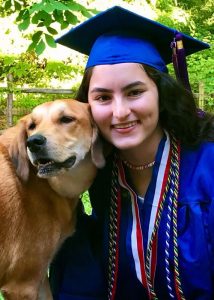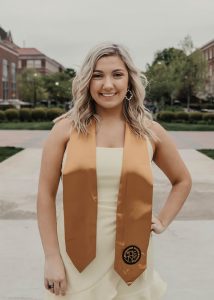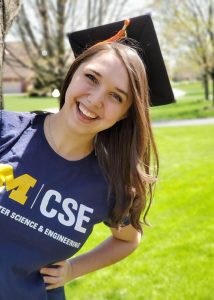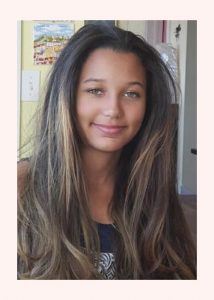While the Class of 2020 did not anticipate a graduation season quite like what they have experienced this year, these recent graduates have learned to make the most out of their situations. Cyberweek.org, in collaboration with young women from the National Center for Women & Information Technology (NCWIT), highlighted the graduation stories of five females, ranging from rising first-years in college to master’s graduates, who have excelled in the world of computing and created incredible strides for girls in STEM.
Here is what these inspirational ladies had to say about graduation, the next steps in their journey, and some advice for future graduates.
 Auva Amirmokri, a recent graduate of Wootton High School, is headed to the University of Maryland to study computer science as a part of their scholars’ program. For the past few summers, she has been working with a non-profit called Technifusion, where she taught programming and robotics to children across a few cities in Maryland. With her work as the director of Technifusion, Auva has discovered her passion for education. She acknowledges fellow NCWIT members, Cindy and Wendy Shi, who founded Technifusion as role models that have shaped Auva and helped her navigate through high school, the tech world, and so much more. Auva says, “They have given me such amazing opportunities with their non-profit organization and have truly changed my life. I am so thankful for them!”
Auva Amirmokri, a recent graduate of Wootton High School, is headed to the University of Maryland to study computer science as a part of their scholars’ program. For the past few summers, she has been working with a non-profit called Technifusion, where she taught programming and robotics to children across a few cities in Maryland. With her work as the director of Technifusion, Auva has discovered her passion for education. She acknowledges fellow NCWIT members, Cindy and Wendy Shi, who founded Technifusion as role models that have shaped Auva and helped her navigate through high school, the tech world, and so much more. Auva says, “They have given me such amazing opportunities with their non-profit organization and have truly changed my life. I am so thankful for them!”
Graduating during the current pandemic was quite hectic to say the least. Auva explained, “My school was a bit late in keeping us updated on what was happening. It was honestly a bit frustrating, but after a few weeks of waiting, we were given our virtual graduation on YouTube. Feeling unfulfilled, some students and PTA members planned a drive-by graduation, which was really enjoyable!”
Like many students, Auva shared the effects of senioritis while at home. “It was honestly hard finding the motivation to continue working on school my last semester, as the pandemic and senioritis do not mix well. I just kept telling myself that I was so close to the finish line that my future self would thank me for learning more and staying focused!”
To all of those who have difficulties with remote leaving, Auva expressed, “I recommend that you set small goals for yourself to achieve first and work your way up to your bigger goals. You’ll feel so accomplished.”
Auva’s advice to students going through obstacles during these unexpected times is, “Just know that this is temporary, and you will get through it! Stay focused on your goals and dreams, and don’t let anything get in your way. I recommend writing down motivational quotes on sticky notes to remind you of your true potential!”
 Madison Thomas is a recent graduate of Purdue University with a degree in Computer Information Technology and is an incoming master’s student within the same department.
Madison Thomas is a recent graduate of Purdue University with a degree in Computer Information Technology and is an incoming master’s student within the same department.
During her last semester of college, Madison said, “My biggest obstacle was procrastination, which I don’t deal with when school is normally face to face. I would recommend not only using a physical planner but also a planner on your phone and time blocking. Once I started time blocking, my life has been so much easier.”
Regarding the next chapter of her life and heading to grad school, Madison said she, “knew from the Summer of 2019 that I wanted to attend graduate school and prepared myself for the application process starting then. I studied for the GRE while also enrolled full time during the summer and took the GRE before Fall 2019 courses started.” While this wasn’t an easy process, it was surely very rewarding. “This was a weight off my shoulders since I wasn’t studying for multiple tests at once. I also asked professors for letters of recommendation early, so they had enough time to write me a proper, well written letter and weren’t crunched on time.”
Madison would like to acknowledge Melinda Johns, High School Computer Science Teacher, Nicole Hands, Purdue Computer Information Technology Instructor, and Dr. Dawn Laux, Purdue Computer Information Technology Instructor, as people that have shaped her to be the powerful student that she is today.
Her advice to the next generation of females in STEM majors, “Please take advantage of your instructors. We are here to help – even if it’s unrelated to the course. Questions regarding internships, career fairs, extracurriculars, full time jobs – please ask us. We want to help.”
Madison’s advice to her younger self highlighted the phrase, “You can do it.”
 Rachel Menge, an Embedded Software Engineer with a B.S.E. in Computer Engineering recently finished her M.S.E. in Computer Science in April 2020 from the University of Michigan. Her next steps are to head off to industry in hopes of gaining tangible skills as well as explore new technologies and places!
Rachel Menge, an Embedded Software Engineer with a B.S.E. in Computer Engineering recently finished her M.S.E. in Computer Science in April 2020 from the University of Michigan. Her next steps are to head off to industry in hopes of gaining tangible skills as well as explore new technologies and places!
Having completed her master’s degree, Rachel provided her advice on pursuing postgraduate education and its impact on one’s career. Rachel told us, “The great debate in undergrad is whether you should go to grad school or industry. The debate in grad school is whether or not to go into academia (being a lecturer, professor, or researcher) or industry. Your bachelors will get you into a job quicker and thus, start generating money (and less debt) quicker.”
Speaking from her experience, “A masters will get you a higher starting salary (which will accumulate over time) and the edge to get into higher positions / more variety in jobs. However, if you want to go into academia, it is almost always required you have a PhD but a PhD will not result in that much of a pay bump and may make you “overqualified” for many jobs.”
Most importantly, Rachel advised students that, “In the end, you need to weigh what job you want to be in and what seems feasible for your current situation.”
 Devi Dheekshita Nelakurti, a graduate of Metro Early College High School will be attending the Ohio State University to major in Biomedical Sciences with a full-ride scholarship provided by the Eminence Fellows Program in 2020. Throughout her high school career, Devi has been involved in artificial intelligence research and bioinformatics research in cancer genetics that advanced to the Intel ISEF 2019 in Phoenix, Arizona.
Devi Dheekshita Nelakurti, a graduate of Metro Early College High School will be attending the Ohio State University to major in Biomedical Sciences with a full-ride scholarship provided by the Eminence Fellows Program in 2020. Throughout her high school career, Devi has been involved in artificial intelligence research and bioinformatics research in cancer genetics that advanced to the Intel ISEF 2019 in Phoenix, Arizona.
When speaking on the challenges of her final semester of high school being remote Devi stated, “One of the biggest obstacles last semester was adjusting to an online classes format so abruptly. One of my coping mechanisms to help me make this transition was to get super organized and plan out my day. Throughout the process, Devi would, “use my Google Calendar and put all my classes as events with Zoom links in the notes section, so that it can send me reminders. Then, I used an application called iStudiez Pro to manage all the tasks for the rest of the semester and additional assignments that came along the way!”
Devi explained her thought process during this unprecedented pandemic to, “reinforce the importance and highlight the lag time between scientific research and its corresponding clinical application. I can be part of this unbounded transfer of knowledge to defeat the time and logistical restrictions of clinical applications of scientific discoveries while making sure they are ethical by continuing my academic career towards being a physician-scientist.”
Like so many rising college students, Devi was, “fearful of leaving my family in such a vulnerable time, but at the same time, I was excited to walk into the next phase of my life that is one step closer to my career!” Devi advises students during this uncertain time to, “Embrace and accept what your life and future holds for you. Instead of trying to resist the changes, try to cope with them so you can be mentally stable and healthy! I learned to be positive by watching, motivating and continuing my hobbies like art and video editing.”
For those of us that are stuck at home this summer, Devi recommends, “Tapping into hobbies while balancing it with fun activities like watching movies can help you be productive and stressed when working or studying from home.”
 Merrill Keating, a rising freshman at the University of Washington, is making the great transition from being a sophomore in high school to a college student this year pursuing a degree in mechanical engineering and artificial intelligence. During her time in high school, Merrill has taken on the leadership role at her school’s FIRST Robotics team and as the founder of a Girl Up club in her community.
Merrill Keating, a rising freshman at the University of Washington, is making the great transition from being a sophomore in high school to a college student this year pursuing a degree in mechanical engineering and artificial intelligence. During her time in high school, Merrill has taken on the leadership role at her school’s FIRST Robotics team and as the founder of a Girl Up club in her community.
Regarding her journey to university, “There is both fear and excitement,” said Merril. “But less than I would normally expect since the pandemic is limiting what can happen on campuses. I suspect many of my classes will continue to be online, at least for the Fall quarter. I have enjoyed virtually meeting and getting to know the cohort of students going through the early admission program with me. I’ve also been focused on time management practices and tools and absorbing as much information about the guidelines and expectations as possible so that I am well-prepared.”
During these uncertain times, Merrill said she chose to focus on what she could control. “I find great purpose and fulfillment in helping others, I joined efforts to help those less fortunate or at risk by 3D printing PPE and ramping up my community service. My summer internship was canceled, so I found or created other opportunities and will be teaching coding classes over the summer in addition to other small projects.”
To the next round of graduates and current students, Merrill advises them to, “Find the value proposition. Seek alternative resources if you aren’t feeling challenged. Don’t be afraid to take a gap year or time off before starting university or taking a job. In many respects, now is one of the best times to reassess what you truly want out of life and your future.”
While the future may be uncertain, Merrill reminds us that, “The education industry is being disrupted and more innovation is coming. Be patient and do what you love. Paint what feels happy.”


